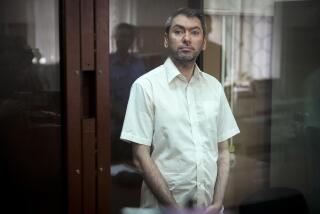His Spirit Moved Him and Indeed, It Moved Us All : Sakharov: Always the optimist, he gained an inner strength that carried him from exile to the leading voice of the Soviet opposition.
- Share via
The death of Andrei D. Sakharov marks the passing not only of a great physicist, but also of one of the world’s most courageous proponents of freedom and human rights.
As the inventor of the Soviet Union’s thermonuclear bomb, Sakharov could have enjoyed a life of privilege and luxury. But to do so would have meant closing his eyes to the injustice and repression around him. This was something that Sakharov, unlike the vast majority of his colleagues, would not do.
Soon after helping to launch the dissidents’ movement in the Soviet Union in the 1960s, Sakharov came to symbolize, more than anyone else, the hope that someday the Soviet regime would become more democratic. He offered a lengthy “Appeal for Gradual Democratization” to Soviet leader Leonid I. Brezhnev in 1970, warning that without far-reaching political liberalization the Soviet Union would suffer economic decline and eventually become a “second-rate provincial power.”
For these views, and for all his subsequent efforts in defense of freedom, Sakharov justifiably gained international renown, including the Nobel Peace Prize in 1975. But in his own country he became an outcast, openly reviled by other members of the Soviet elite. His articles were forbidden to be published. All his privileges were stripped away.
Yet, even after he was exiled to the city of Gorky in 1980 for having denounced the Soviet invasion of Afghanistan, Sakharov never lost hope. Under often brutal conditions, he continued to speak out on behalf of democratic values and to condemn repression in the Soviet Union. The nearly seven years that he spent in exile would have been enough to break the spirit of most men, but Sakharov seemed, if anything, to gain inner strength and to uphold his principles even more firmly as time passed.
Following Mikhail S. Gorbachev’s rise to power in 1985, the kinds of political reforms that Sakharov had long advocated finally became plausible. Sakharov was released from Gorky in December, 1986, and upon returning to Moscow, found that Soviet leaders themselves now perceived a connection between political liberalization and economic vitality, just as he had argued years before. Although many within the Communist Party elite continued to regard Sakharov with hostility and suspicion, he was able to make an extraordinary political comeback in the last few years of his life.
In April of this year Sakharov was elected by the Soviet Academy of Sciences as a delegate to the new Congress of People’s Deputies, despite attempts by conservative members of the academy to thwart his nomination. From the very first session of the legislature in May and June, Sakharov consistently urged the need for radical changes and warned of the potential for abuse that he saw being created in Gorbachev’s consolidation of power. Although Sakharov was a soft-spoken and humble man, he never hesitated to speak boldly at the congress in support of democratic reform, amid heckling from orthodox Communist deputies.
Sakharov also became one of the founders and leaders of the congress’ Inter-regional Group, a caucus of deputies who strongly support liberal democracy. On behalf of the group, Sakharov stood up last week in the legislature and called for a nationwide two-hour strike to generate pressure for faster change. Just hours before he died, he met with members of the Interregional Group to plan how to secure a change in the Soviet constitution that would end the monopoly of power now guaranteed to the Communist Party.
In all these activities, what was most striking about Sakharov was his spirit--a spirit that will live on in the hearts of all those in the Soviet Union and elsewhere who support democratic freedoms.
Speaking at Harvard University earlier this year, Sakharov offered an exceptionally gloomy view of the durability of reformist trends in the Soviet Union. He warned that his country was in the throes of a “profound crisis” that could still have a “disastrous outcome.” But when asked later whether he still had any reason for hope, Sakharov smiled broadly and said, “Of course. I’m always an optimist.”
It was this optimism, combined with almost superhuman courage and integrity, that spurred Sakharov on and made him the truly remarkable figure that he was.
More to Read
Sign up for Essential California
The most important California stories and recommendations in your inbox every morning.
You may occasionally receive promotional content from the Los Angeles Times.













